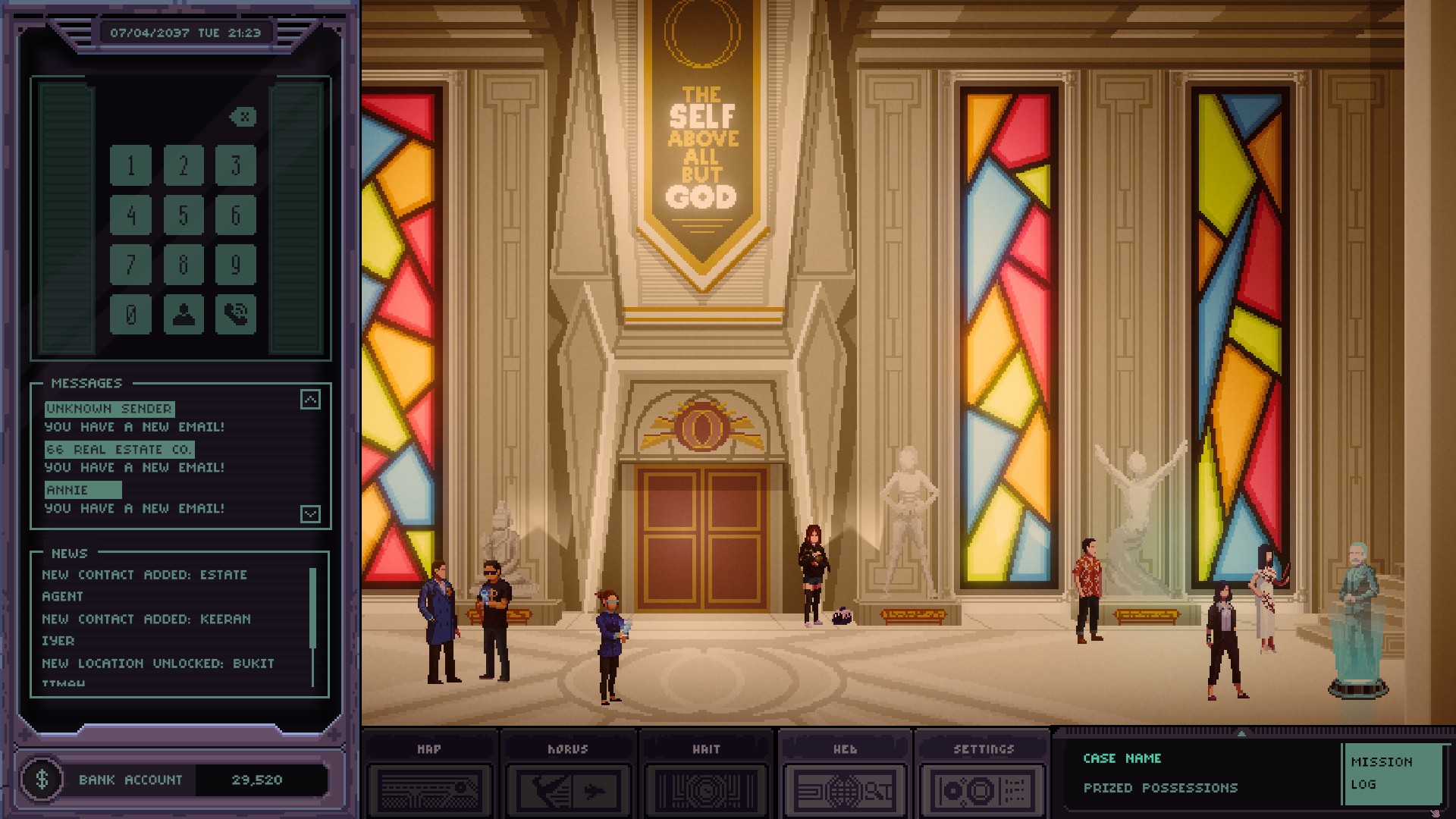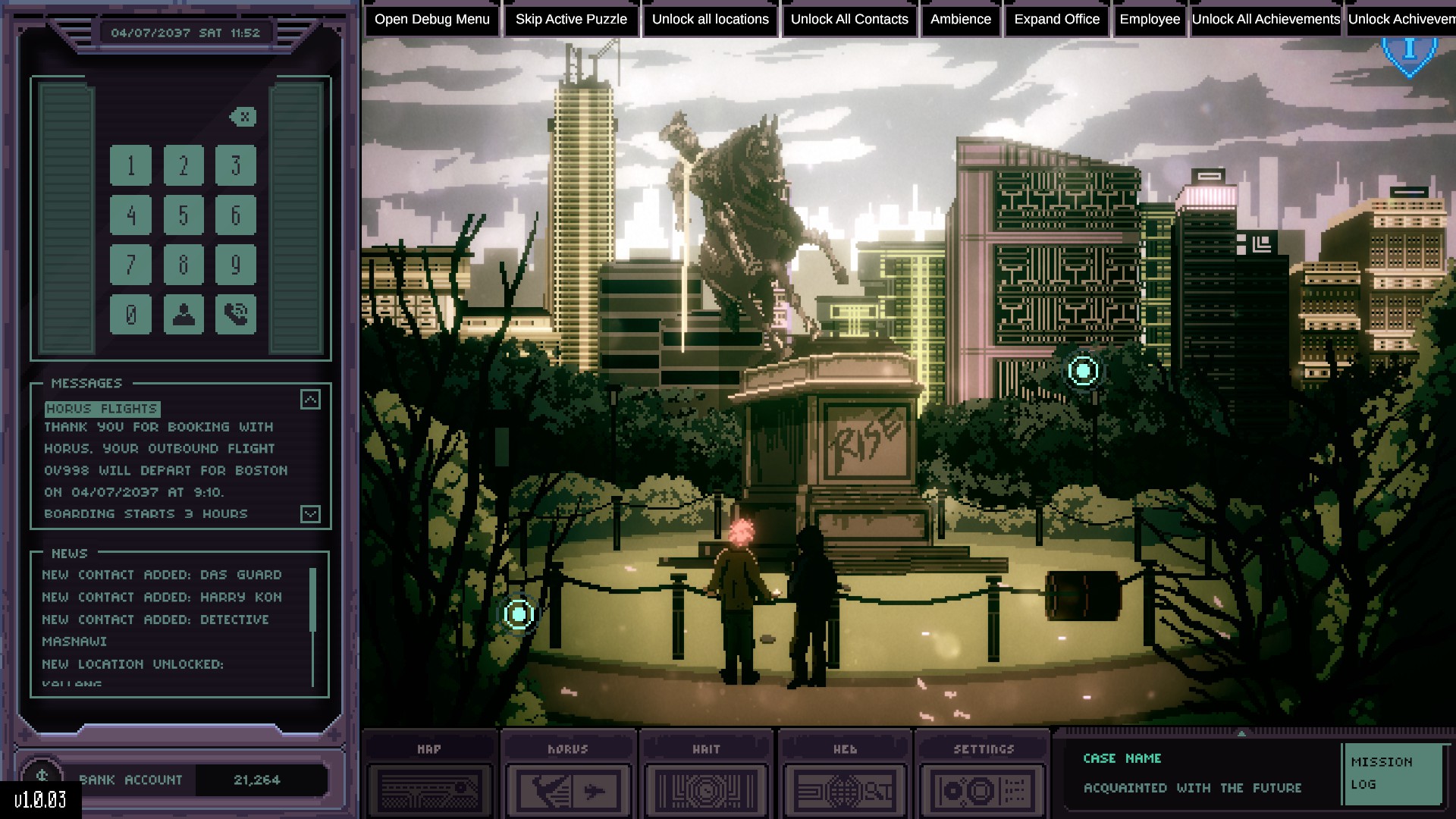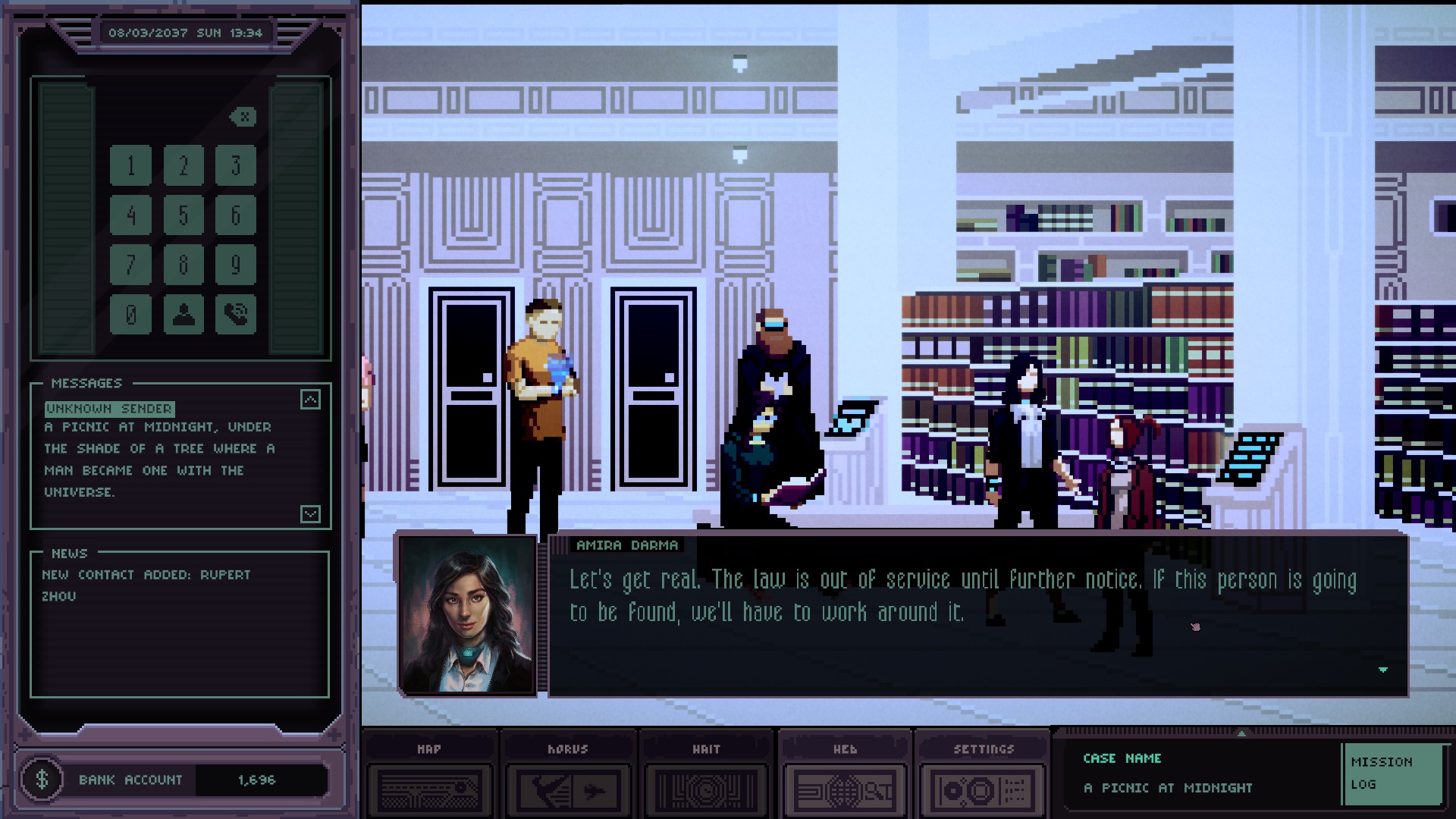Our Verdict
Chinatown Detective Agency is a solid hardboiled detective adventure with a unique DIY approach to clue-solving—but it’s most impressive as a cultural artefact.
PC Gamer's got your back
What is it? A point-and-click adventure set in a future Singapore.
Release date April 7
Developer General Interactive Co
Publisher HumbleGames/WhisperGames
Multiplayer? No
Link Official site
As a lifelong lover of science fiction and a Singaporean, playing Chinatown Detective Agency was a rare experience. Not long after entering this near-future version of my home country, it became clear that this game has two distinct layers, aimed at two distinct audiences: one is a point-and-click adventure for folks who grew up with Broderbund’s Carmen Sandiego series which took them all over the world. The other, while not mutually exclusive, is a game made especially for Singaporeans.
In 2037, the country has gone through the unthinkable process of deregulation, there’s anti-government graffiti on the train, drones and droids are a routine sight, and there’s only one human librarian left in the country. You play as Amira Darma, an ex-cop starting out as a private investigator in a run-down Chinatown shophouse. As she takes on cases and meets clients, Amira gets to travel the world while pulling at the threads of a much bigger, more dangerous mystery.

On the most basic level, it is really fucking cool to explore your home city in pixels—even a fictional depiction plastered with the standard liability statement that the game is the product of the devs’ imaginations (the government is notoriously litigious). This is something that Americans, Europeans and the global North will never understand because New York, Paris, and London (and to an extent, villainized depictions of Cold War-era Moscow and Beijing) are old hat. In mainstream pop culture, Singapore’s western claims to fame are relatively recent, namely the last season of HBO’s Westworld, and Crazy Rich Asians, which was a film for Americans. I cannot understate how important it is that CDA features Singaporean voice acting with the local English accent, punctuated with snippets of Singlish and Malay, and it rules.
Overall, General Interactive Co. pulls off a surface narrative that works for a general audience unfamiliar with Singaporean in-jokes and cliches, as well as more nuanced storytelling that taps into real hyperlocal knowledge: Singaporean megachurch culture, class politics, and our potable water supply. Of course on a broader level, these issues are barely unique to Singapore—widening economic disparity and environmental decline are everywhere. The main plot isn’t rocket science—mostly tried-and-tested dystopian tropes like rogue AIs, craven tech moguls, and omnipresent surveillance. A lot of the speculative story embellishments are extensions of trends like mass automation, the rise of labor unions, and corporatism.

CDA’s main thing is Googling clues yourself—there’s a UI button to tab you out into a browser.
Most cases are relatively short: examining and returning an object, decoding a message, or figuring out clues, which might take you to different cities. Amira uses a travel program called HORUS and an in-game clock to plan flights. There are a handful of simple combat events which are very basic point-and-shoot scenarios, though you do get the choice to wound or kill. Eventually Amira must choose a main client—I went with shady information broker Tiger Lily, who runs a “health club” in the red-light district of Geylang. Her case involves a local megachurch—the Temple of the Self—and the wealthy, dysfunctional family behind it. It’s a pointed look at megachurch culture in Singapore, and one of the more compelling story arcs. I came away part exhilarated, part bitter to be reminded of evangelism’s role in the relationship between Singapore’s conservative values and its outwardly secular image.
The puzzles are probably the most divisive part of the game. CDA’s main thing (which I mostly enjoyed) is Googling clues yourself—there’s a UI button to tab you out into a browser. Even as someone who loves ciphers and taking notes, a couple of the more involved puzzles—the stone tablet in particular—were tiresome (partly due to the state of the review build I played). There’s a fine line between giving the player a sense of empowerment and satisfaction, while still pushing them to break a little sweat, and here CDA wavers. Thankfully the game offers help in the form of librarian Mei Ting, so it’s really up to how much of a masochist you are.

Small inconsistencies made for an occasionally frustrating playthrough. The initial part of the game auto-saves after each case. You’re supposed to be able to save at your own discretion after you’ve chosen a main client, but this feature only worked for a short window of time; as a result, when I failed a key case, I had to start the whole thing again. HORUS was a wasted opportunity to deepen in-game money management, as every flight costs a flat $550. Single arbitrary weeks pass between cases—I’m not sure why Amira would wait a week before divulging a critical piece of information to a client. She pays monthly office rent and utilities and eventually hires an employee, to whom she then doesn’t pay a salary, which is funny when you consider the workers’ union subplot in the game.
At the end, I’m confronted with the consequences of my actions: my heavy-handed approach means certain clients won’t work with me, and working with Tiger Lily elevates her to even more power. Overall, the writing is a little uneven—the main cast is fairly well-characterized with distinct dialogue styles, but a few segments of heavy-handed exposition veer into overly theatrical territory. Most NPCs had one or two canned lines of dialogue that occasionally included weird, mildly jarring non-sequiturs, but is consistent with the idiosyncratic nature of point-and-click adventures as extensions of the developers’ personalities

Even with these flaws, CDA is bound to be particularly meaningful to a player like me, and the task of reviewing it for a general audience is rather overwhelming. Because of the lack of my cultural representation in games—Southeast Asian indies are on the rise, though—CDA inadvertently takes on an unfair talismanic weight for Singaporeans who still bear the residual indignity of William Gibson’s 1993 WIRED essay, Disneyland with the Death Penalty, which decried the country as a sterile braindead hellscape. It’s a reminder how well fiction deepens our relationship with our respective homes and environments, and how through fiction we can explore speculative pathways to different futures. Perhaps CDA was always going to be a loaded experience for me, though I could leave the generic main plot and spend all day going over its depiction of local problems and culture. As far as point-and-click adventures go, it’s a pretty good debut, with room for improvement. As a cultural artefact, though, it’s pretty great.
Chinatown Detective Agency is a solid hardboiled detective adventure with a unique DIY approach to clue-solving—but it’s most impressive as a cultural artefact.

Alexis Ong is a freelance culture journalist based in Singapore, mostly focused on games, science fiction, weird tech, and internet culture. For PC Gamer Alexis has flexed her skills in internet archeology by profiling the original streamer and taking us back to 1997's groundbreaking all-women Quake tournament. When she can get away with it she spends her days writing about FMV games and point-and-click adventures, somehow ranking every single Sierra adventure and living to tell the tale.
In past lives Alexis has been a music journalist, a West Hollywood gym owner, and a professional TV watcher. You can find her work on other sites including The Verge, The Washington Post, Eurogamer and Tor.


